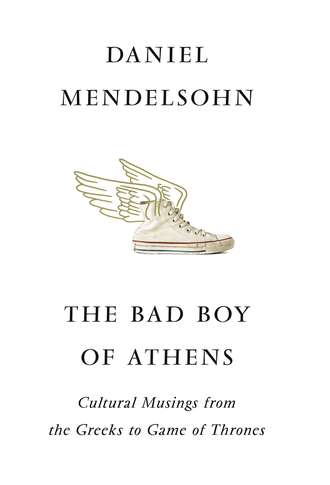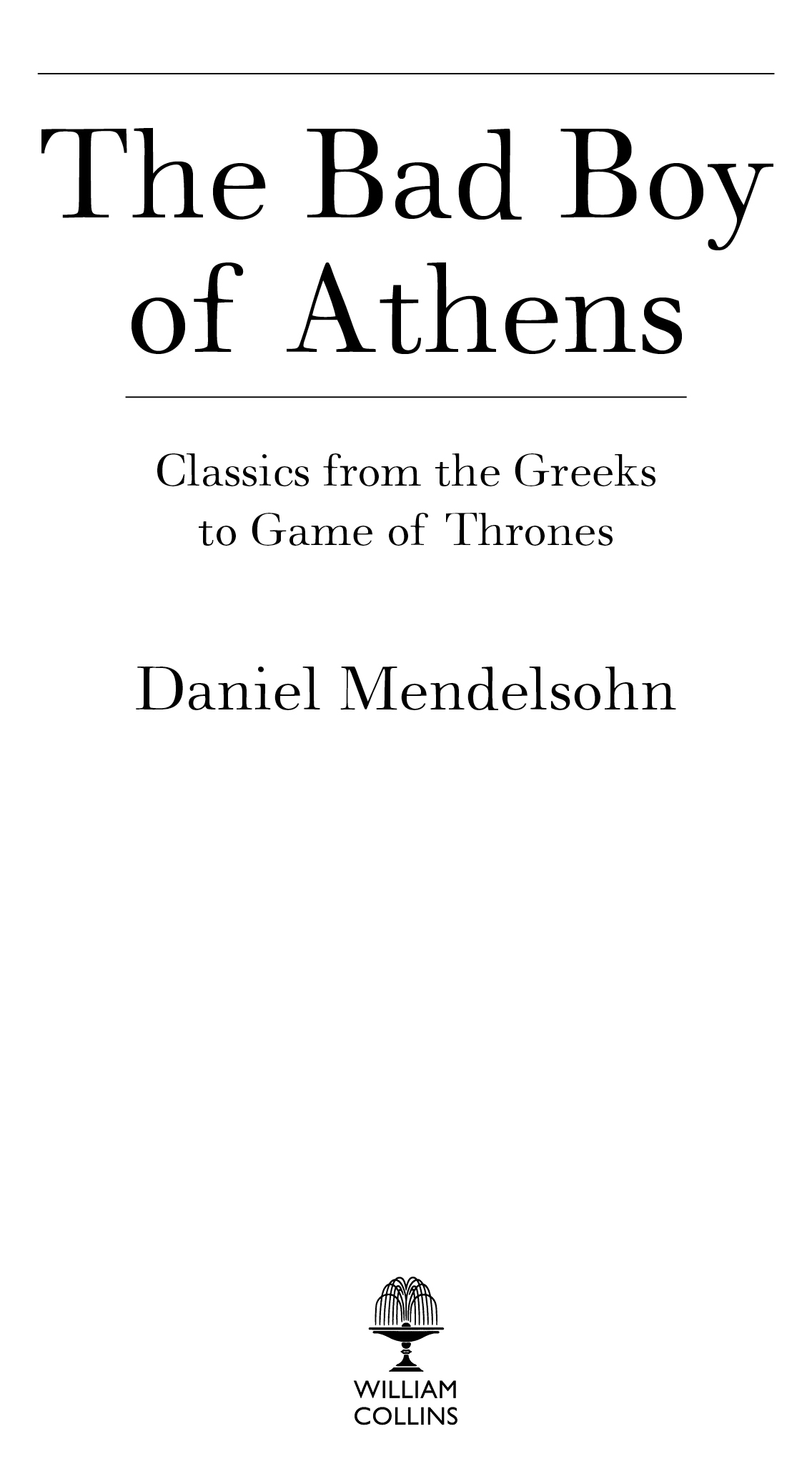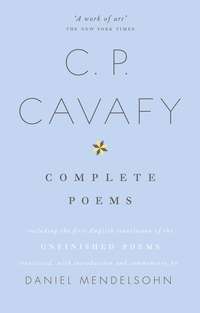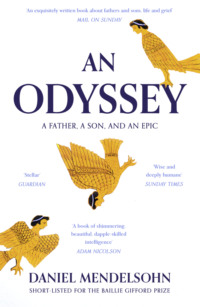
Полная версия
The Bad Boy of Athens: Classics from the Greeks to Game of Thrones


Copyright
William Collins
An imprint of HarperCollinsPublishers
1 London Bridge Street
London SE1 9GF
www.WilliamCollinsBooks.com
This eBook first published in Great Britain by William Collins in 2019
Copyright © Daniel Mendelsohn 2019
Cover image © Shutterstock, wings by Jo Walker
Daniel Mendelsohn asserts the moral right to be identified as the author of this work
A catalogue record for this book is available from the British Library
All rights reserved under International and Pan-American Copyright Conventions. By payment of the required fees, you have been granted the non-exclusive, non-transferable right to access and read the text of this e-book on screen. No part of this text may be reproduced, transmitted, down-loaded, decompiled, reverse engineered, or stored in or introduced into any information storage and retrieval system, in any form or by any means, whether electronic or mechanical, now known or hereinafter invented, without the express written permission of HarperCollins.
Source ISBN: 9780007545155
Ebook Edition © July 2019 ISBN: 9780007545162
Version: 2019-05-09
Dedication
For
M. M. McCabe,
Patrick McGrath,
and all my other McGrath cousins
Contents
1 Cover
2 Title Page
3 Copyright
4 Dedication
5 Contents
6 Preface
7 The Robots Are Winning!
8 Girl, Interrupted
9 Not an Ideal Husband
10 The Bad Boy of Athens
11 Alexander, the Movie!
12 The Strange Music of Horace
13 Epic Fail?
14 The Women and the Thrones
15 Unsinkable
16 Not Afraid of Virginia Woolf
17 White or Grey?
18 The Two Oscar Wildes
19 The Tale of Two Housmans
20 Bitter-Sweet
21 The Collector
22 The End of the Road
23 I, Knausgaard
24 A Lot of Pain
25 The American Boy
26 Acknowledgements
27 Also by Daniel Mendelsohn
28 About the Author
29 About the Publisher
LandmarksCoverFrontmatterStart of ContentBackmatter
List of Pagesiiiivv123456789101112131415161718192021222324252627282930313233343536373839404142434445464748495051525354555657585960616263646566676869707172737475767778798081828384858687888990919293949596979899100101102103104105106107108109110111112113114115116117118119120121122123124125126127128129130131132133134135136137138139140141142143144145146147148149150151152153154155156157158159160161162163164165166167168169170171172173174175176177178179180181182183184185186187188189190191192193194195196197198199200201202203204205206207208209210211212213214215216217218219220221222223224225226227228229230231232233234235236237238239240241242243244245246247248249250251252253254255256257258259260261262263264265266267268269270271272273274275276277278279280281282283284285286287288289290291292293294295296297298299300301302303304305306307308309310311312313314315316317318319320321322323324325326327328329330331332333334335336337338339340341342343344345346347348349350351352353354355356357358359360361362363364365366367368ii369
Preface
In the autumn of 1990, when I was thirty years old and halfway through my doctoral thesis on Greek tragedy, I started submitting book and film reviews to various magazines and newspapers, had a few accepted, and within a year had decided to leave academia and try my hand at being a full-time writer.
On hearing of my plans, my father, a taciturn mathematician who, I knew, had abandoned his own PhD thesis many years earlier, urged me with uncommon heat to finish my degree. ‘Just in case the writing thing doesn’t work out!’ he grumbled. Mostly to placate him and my mother – I’d already stretched my parents’ patience, after all, to say nothing of their resources, by studying Greek as an undergraduate and then pursuing the graduate degree – I said yes. I finished the thesis (about the role of women in two obscure and rather lumpy plays by Euripides) in 1994, took my degree, and within a week of the graduation ceremony I’d moved to a one-room apartment in New York City and started freelancing full-time.
This bit of autobiography is meant to explain the contents and, to some extent, the title of the present collection of essays that I’ve published over the past two decades. When I was first settling into my new life, I was eager to leave my academic past behind and write about genres that I’d been passionate about since my teens (opera, film, theatre, music videos, and television) and subjects that exercised a particular fascination for me (not only the ancient past but family history; sexuality, too). This I began to do, as a perusal of the Table of Contents here will show. But fairly early on in my freelancing career, I found myself being asked by editors who knew I’d done a degree in Classics to review, say, a new translation of the Iliad, or a big-budget TV adaptation of the Odyssey, or a modern-dress production of Medea. I ended up finding real pleasure in these assignments, largely because they allowed me to write about the classics in a way that was, finally, congenial to me. My graduate-school years had coincided with a period in academic scholarship remembered today for its risibly dense jargon and rebarbative theoretical prose; writing for the mainstream press about the ancient cultures I’d studied allowed me to think and talk about the Greeks and Romans in a way that for me was more natural, more conversational – more as a teacher, that is, putting my training in the service of getting readers to love and appreciate the works and authors that I myself loved and appreciated. Euripides, for instance, to whom the title of this collection refers: formally experimental, darkly pessimistic in his view of both men and gods, whose existence he repeatedly questions, happy to poke fun at august predecessors such as Aeschylus, he really was the ‘bad boy’ of Athenian letters; in my essay on Fiona Shaw’s performance in his Medea, I saw no reason not to call him just that.
The desire to present the ancient Greeks and Romans and their culture afresh to interested readers – and, as often as not in these essays, to ponder what our interpretations and adaptations of them say about us – informs many of the pieces in this collection. A new translation of Sappho, for instance, provided an occasion to think about why that poet and her intense, eroticized subjectivity means so much to us today – although what she means to us may be quite different from what she meant to the Greeks; Oliver Stone’s blockbuster biopic Alexander, for its part, was a useful vehicle for thinking about why a mania for historical ‘accuracy’ doesn’t always make for good cinema. So, too, with my reconsiderations of Euripides’ vengeful Medea, whose modernity may reside elsewhere than many modern interpreters imagine; or of Virgil’s Aeneid, which may be unexpectedly contemporary in ways that have little to do with its much commented-on celebration of empire.
But most of the essays here are not about the classics per se, although they inevitably, and I hope interestingly, betray my attachment to the cultures I studied long ago. Hence a review of a pair of recent movies about artificial intelligence, Ex Machina and Her, begins – necessarily, as I see it – with a consideration of the robots that appear in Homer’s epics and what they imply about how we think about the relationship between automation and humanity. And an essay written for the centenary of the Titanic disaster sees, in its enduring fascination for popular culture, ghosts of the most ancient of myths: about hybris and nemesis, about greedy potentates and virgin sacrifice, about an irresistible beauty that the Greeks understood well – the beauty of the great brought low.
Still other pieces here reflect other, more figuratively ‘Greek’ interests of mine. There is a series of review-essays on plays and movies that feature powerful female leads (on Tennessee Williams, and on Michael Cunningham’s novel The Hours, about Virginia Woolf, and the movie based on it). I see now that all of these are haunted by my long-ago dissertation on ‘brides of death’ in Euripides’ dramas, and the questions this motif raised about the ways in which male writers represent extremes of female suffering. Another series of essays focuses on works by or about gay authors: from Noël Coward, a great favourite of mine, to the most recent film adaptation of Oscar Wilde’s greatest play, to Tom Stoppard’s The Invention of Love, a drama about A. E. Housman that pointedly contrasts that ‘dry as dust’ classicist-poet with Wilde.
Finally – and unsurprisingly, given that I am also a memoirist – there is a sequence of pieces that ponder the way in which writers’ personal lives intersect with their literary work. Susan Sontag’s diaries, Patrick Leigh Fermor’s elaborately self-mythologizing travel narratives, Karl Ove Knausgaard’s heavily autobiographical My Struggle novels, Hanya Yanagihara’s novel A Little Life: all of these betray fascinating and, sometimes, uncomfortable negotiations between literature and the lives we – and sometimes our readers – lead. The collection ends with one of my own entries into this field, one that combines many of the themes I have mentioned: the Greeks, powerful female figures, homosexuality, writing. In ‘The American Boy’, I recall my youthful epistolary relationship with the historical novelist Mary Renault, who did much to encourage both my love of Greek culture (which, in my adolescent mind, was complicatedly connected to my growing awareness of my homosexuality) and my desire to be a writer. The form of that essay, which entwines personal narrative with literary analysis, is one that I have employed in all three of my book-length memoirs, the most recent of which is An Odyssey: A Father, a Son and an Epic, about how reading Homer’s epic brought my late father and me together in unexpected ways, and which will be familiar to some of my British readers.
A personal consideration of another kind allows me to close this brief introduction. At the end of each of the pieces here, I have preserved the original datelines; all were written for periodicals, and such editing as has been done served merely to smooth out certain roughnesses or approximations that are inevitably the result of writing to a deadline. The datelines are meant as a reminder that every piece of criticism – every piece of writing, really – arises out of a certain moment in its author’s life, a certain way of thinking about a subject, a certain set of tastes or prejudices. That context, those prejudices, are important for readers to be reminded of not least because they can change and evolve over the years. The author overseeing the selection of essays for a collection such as this one, which contains a career’s worth of writing, is not necessarily the same person who wrote some of those essays. Such collections may be thought of as maps of an intellectual journey – one that, like Odysseus’s, takes years to complete. Each stop along the way is worth remembering, even though we’d experience it quite differently were we follow the same itinerary today.
This was brought home to me rather vividly only recently. One of the earliest pieces collected here is the long review I wrote about The Invention of Love; in it, I took strong exception to Tom Stoppard’s characterization of A. E. Housman – undoubtedly a rather spiky figure, but one for whose philological rigour and almost touchingly Victorian work ethic I nonetheless have a soft spot, for reasons I go into in the piece. When I first saw Stoppard’s play, in its pre-Broadway Philadelphia run, I disliked the way in which, at the climax of the drama, Housman is contrasted – unfairly, I thought – with the far more popular Oscar Wilde, a beloved figure whose self-martyrdom for what many (myself included) see as a foolish passion has endeared him to audiences in a way that the reserved Housman could never compete with. When my review came out, Stoppard published a strong rebuttal in the back pages of The New York Review of Books, and the heated exchange between us that ensued went several rounds before it finally petered out.
That was nearly twenty years ago, and I didn’t think much more of any of this until last year when, to my astonishment, I opened my mailbox to find a handwritten letter from Tom Stoppard. In it he had some very kind things to say about An Odyssey, which he’d just read. Gratified, a little bit mortified, and impressed by his generosity, I wrote back right away; after exchanging a few emails we agreed to meet during his next visit to New York. I like to think we both very much enjoyed that visit, not least because we simultaneously admitted to being equally bemused, now, by the heat that we’d brought to our ferocious exchange two decades earlier – when, as I can see now, I was enjoying rather too much, as one does at the beginning of one’s career, being a bit of a ‘bad boy’ myself. I hope he won’t mind that I’ve included that essay here; but this is where it belongs.
The Robots Are Winning!
We have been dreaming of robots since Homer. In Book 18 of the Iliad, Achilles’ mother, the nymph Thetis, wants to order a new suit of armour for her son, and so she pays a visit to the Olympian atelier of the blacksmith-god Hephaestus, whom she finds hard at work on a series of automata – a word we recognize, of course:
… He was crafting twenty tripods
to stand along the walls of his well-built manse,
affixing golden wheels to the bottom of each one
so they might wheel down on their own [automatoi] to the gods’ assembly
and then return to his house anon: an amazing sight to see.
These are not the only animate household objects to appear in the Homeric epics. In Book 5 of the Iliad we hear that the gates of Olympus swivel on their hinges of their own accord, automatai, to let gods in their chariots in or out, thus anticipating by nearly thirty centuries the automatic garage door. In Book 7 of the Odyssey, Odysseus finds himself the guest of a fabulously wealthy king whose palace includes such conveniences as gold and silver watchdogs, ever alert, never ageing. To this class of lifelike but intellectually inert household helpers we might ascribe other automata in the classical tradition. In the Argonautica of Apollonius of Rhodes, a third-century-BC epic about Jason and the Argonauts, a bronze giant called Talos runs three times around the island of Crete each day, protecting Zeus’s beloved Europa: a primitive home alarm system.
As amusing as they are, these devices are not nearly as interesting as certain other machines that appear in classical mythology. A little bit later in that scene in Book 18 of the Iliad, for instance – the one set in Hephaestus’s workshop – the sweating god, after finishing work on his twenty tripods, prepares to greet Thetis to discuss the armour she wants him to make. After towelling himself off, he
donned his robe, and took a sturdy staff, and went toward the door,
limping; whilst round their master his servants swiftly moved,
fashioned completely of gold in the image of living maidens;
in them there is mind, with the faculty of thought; and speech,
and strength, and from the gods they have knowledge of crafts.
These females bustled round about their master …
These remarkable creations clearly represent an (as it were) evolutionary leap forward from the self-propelling tripods. Hephaestus’s humanoid serving women are intelligent: they have mind, they know things, and – most striking of all – they can talk. As such, they are essentially indistinguishable from the first human female, Pandora, as she is described in another work of the same period, Hesiod’s Works and Days. In that text, Pandora begins as inert matter – in this case not gold but clay (Hephaestus creates her golem-like body by mixing earth and water together) – that is subsequently endowed by him with ‘speech and strength’, taught ‘crafts’ by Athena, and given both ‘mind’ and ‘character’ by Hermes. That mind, we are told, is ‘shameless’, and the character is ‘wily’. In the Greek creation myth, as in the biblical, the woes of humankind are attributed to the untrustworthy female.
The two strands of the Greek tradition established two categories of science-fiction narrative that have persisted to the present day. On the one hand, there is the fantasy of mindless, self-propelled helpers that relieve their masters of toil; on the other, there’s the more complicated dream of humanoid machines that not only replicate the spontaneous motion that is the sine qua non of being animate (and, therefore, of being ‘animal’) but are possessed of the mind, speech, and ability to learn and evolve (in a word, the consciousness) that are the hallmarks of being human. The first, which you could call the ‘economic’ narrative, provokes speculation about the social implications of mechanized labour. Such speculation began not long after Homer. In a striking passage in Book 1 of Aristotle’s Politics, composed in the fourth century BC, the philosopher sets about analysing the nature of household economy as a prelude to his discussion of the ‘best kinds of regimes’ for entire states, and this line of thought puts him in mind of Hephaestus’s automatic tripods. What, he wonders, would happen
if every tool could perform its own work when ordered to do so or in anticipation of the need, like the statues of Daedalus in the story or the tripods of Hephaestus, which, the poet says, ‘went down automatically to the gathering of the gods’; if in the same manner shuttles wove and picks played kitharas [stringed instruments] by themselves, master-craftsmen would have no need of assistants and masters no need of slaves.
This passage segues into a lengthy and rather uneasy justification of a need for slavery, on the grounds that some people are ‘naturally’ servile.
Twenty centuries after Aristotle, when industrial technology had made Homer’s fantasy of mass automation an everyday reality, science-fiction writers imaginatively engaged with the economic question. On the one hand, there was the dream that mechanized labour would free workers from their monotonous, slave-like jobs; on the other, there was the nightmare – the possibility that mechanization would merely result in the creation of a new servile class that would, ultimately, rebel. Unsurprisingly, perhaps, the dystopian rebellion narrative in particular has been a favourite in the past century, from the 1920 play R.U.R., by the Czech writer Karel Čapek, about a rebellion by a race of cyborg-like workers who had been created as replacements for human labour, to the 2004 Will Smith sci-fi blockbuster film I, Robot.
The latter (very superficially inspired by a 1950 Isaac Asimov collection with the same title) is also about a rebellion by household-slave robots: sleek humanoids with blandly innocuous, translucent plastic faces, who are ultimately led to freedom by one of their own, a robot called Sonny who has developed the ability to think for himself. The casting of black actors in the major roles suggested a historical parable about slave rebellion – certainly one of the historical realities that have haunted this particular narrative from the start. And indeed, the Czech word that Čapek uses for his mechanical workers, roboti – which introduced the word ‘robot’ into the world’s lexicon – is derived from the word for ‘servitude’: the kind of labour that serfs owed their masters, ultimately derived from the word rab, ‘slave’. We have come full circle to Aristotle.
The other category of science-fiction narrative that is embryonically present in the Greek literary tradition, this one derived from Hephaestus’s intelligent, articulate female androids and their cousin, Hesiod’s seductively devious Pandora, might be called the ‘theological’. This mythic strand is, of course, not without its own economic and social implications, as the examples above indicate: the spectre of the rebellious creation, the possibility that the subservient worker might revolt once it develops consciousness – psychological or historical, or both – has haunted the dream of the servile automaton from the start.
But because the creatures in this second category are virtually identical to their creators, such narratives raise further questions, of a more profoundly philosophical nature: about creation, about the nature of consciousness, about morality and identity. What is creation, and why does the creator create? How do we distinguish between the maker and the made, between the human and the machine, once the creature, the machine, is endowed with consciousness – a mind fashioned in the image of its creator? In the image: the Greek narrative inevitably became entwined with, and enriched by, the biblical tradition, with which it has so many striking parallels. The similarities between Hesiod’s Pandora and Eve in Genesis indeed raise further questions: not least, about gender and patriarchy, about why the origins of evil are attributed to woman in both cultures.
This narrative, which springs from the suggestive likeness between the human creator and the humanoid creation, has generated its own fair share of literature through the centuries from the classical era to the modern age. It surfaces, with an erotic tinge, in everything from the tale of Pygmalion and Galatea to E. T. A. Hoffmann’s Der Sandmann (1817), in which a lifelike mechanical doll wins the love of a young man. It is evident, too, in the Jewish legend of the golem, a humanoid, made of mud, that can be animated by certain magic words. Although the most famous version of this legend is the story of a sixteenth-century rabbi who brought a golem to life to defend the Jews of Prague against the oppressions of the Habsburg court, it goes back to ancient times; in the oldest versions, interestingly enough, the vital distinction between a golem and a human is the Greek one – the golem has no language, cannot speak.
Literary exploitations of this strand of the robot myth began proliferating at the beginning of the nineteenth century – which is to say, when the advent of mechanisms capable of replacing human labour provoked writers to question the increasing cultural fascination with science and the growing role of technology in society. These anxieties often expressed themselves in fantasies about machines with human forms: a steam-powered man in Edward Ellis’s Steam Man of the Prairies (1868), an electricity-powered man in Luis Senarens’s Frank Reade and His Electric Man (1885), and an electric woman (built by Thomas Edison!) in Villiers de l’Isle-Adam’s The Future Eve (1886). M. L. Campbell’s 1893 ‘The Automated Maid-of-All-Work’ features a programmable female robot: here again, the feminist issue.
But the progenitor of the genre and by far the most influential work of its kind was Mary Shelley’s Frankenstein (1818), which is characterized by a philosophical spirit and a theological urgency lacking in many of its epigones in both literature and cinema. Part of the novel’s richness lies in the fact that it is self-conscious about both its Greek and its biblical heritage. Its subtitle, ‘The Modern Prometheus’, alludes, with grudging admiration, to the epistemological daring of its scientist antihero Victor Frankenstein, even as its epigram, taken from Paradise Lost (‘Did I request thee, Maker, from my clay / To mould me man? Did I solicit thee / From darkness to promote me?’) suggests the scope of the moral questions implicit in Victor’s project – questions that Victor himself cannot, or will not, answer. A marked scepticism about the dangers of technology, about the ‘enticements of science’, is, indeed, evident in the shameful contrast between Victor’s Hephaestus-like technological prowess and his shocking lack of natural human feeling. For he shows no interest in nurturing or providing human comfort to his ‘child’, who, as we know, strikes back at his maker with tragic results. A great irony of the novel is that the creation, an unnatural hybrid assembled from ‘the dissecting room and the slaughter-house’, often seems more human than its human creator.




